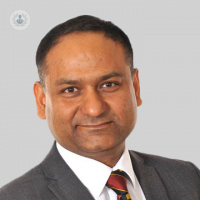Knee replacement: Preparation and recovery
Written in association with:If you are considering knee replacement surgery, you might be wondering how best to prepare for this procedure, whether the surgery is right for you and if there are different types of knee replacement surgeries to choose from.

We found out the answers to such questions by speaking with leading orthopaedic knee and hip surgeon, Mr Rohit Jain. We learned how ‘pre-habilitation’ prepares patients who are undergoing knee replacement and how it helps to promote a quicker recovery.
How should a patient prepare for a knee replacement surgery?
A joint replacement surgery like a knee replacement is teamwork between the surgeon, patient and physiotherapist. Every member of the team has to play his or her part to get a good result.
Patients who have maintained a good health and have a good baseline function perform really well after this joint replacement surgery.
Preparing and enhancing one’s functional capacity helps to withstand and recover a major surgery. This is called pre-habilitation – a multidimensional approach that involves correcting the medical problems, doing physical exercises, eating healthy and addressing any stress and anxiety prior to knee replacement surgery.
Prior to the knee replacement surgery, patients are offered an enrolment in ‘Joints School’ that is run by physiotherapists. These schools are primarily aimed to make the patients more aware of the various parts of the surgical journey and engaging them to do exercises before and after surgery.
Success of knee replacement and recovery depends on a strong partnership between the specialist team and patient.
How long does it take to recover from knee replacement surgery?
The hospital stay after a knee replacement surgery is approximately 48 to 72 hours. Our team offers an enhanced recovery programme, which allows patients to be up and moving as soon as possible. The quicker patients can move, the better the recovery generally will be. It allows for a reduced stay in hospital and function of the knee returns more quickly.
Driving can resume at approximately six weeks post-knee-replacement surgery. Swelling goes down at around three months. The full functional recovery of the knee can take up to 12 to 18 months to achieve.
What are the different types of knee replacement surgery?
There are two types of knee replacement surgery: total knee replacement and partial knee replacement.
The prosthetic implants can be ‘off the shelf’ or can be made ‘bespoke’. Choosing the type of knee prosthetic can be like buying a suit – you can buy one off the rack or alternatively get one tailored to your measurements.
In the past, the sizes of knee prostheses were very limited. However, we now have a whole range of sizes available and we can match the patient’s knees with the prosthetics that are closest in size.
In other cases, CT scans can be used to allow for 3D planning and 3D printing of bespoke custom-made knee implants. This custom technology has been implemented within the last three to four years.
Another advancement that knee replacement surgery has witnessed is the use of robotics. We now have the capability to use computerised technology to help enhance the placement of the various parts of a knee replacement. This allows for as accurate positioning as possible.
If you currently suffer from knee pain, feel free to visit Mr Rohit Jain’s Top Doctors profile to book a consultation with him.


